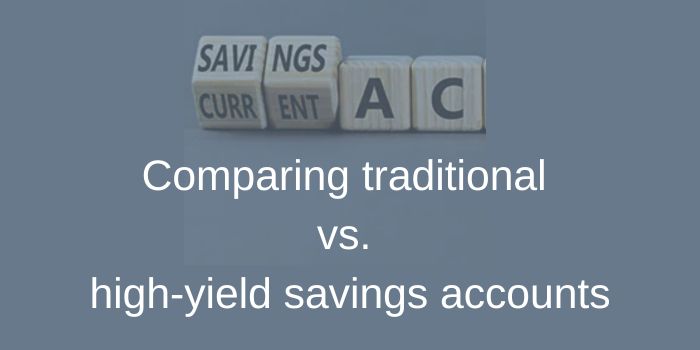Being aware of the distinct kinds of savings bank accounts available in the market is essential. Among these, high-yield and traditional bank accounts stand out. Read on to understand both account types and their crucial differences.
Traditional savings account
Traditional or conventional bank accounts are the regular, standard savings accounts offered by banks. They are considered safe avenues to store your money and offer easy fund access. While they do offer a satisfactory rate of interest on the account balance, the primary goal of traditional savings accounts is not to grow your money but to keep it safe and make day-to-day transactions. They are ideal for daily banking requirements such as bill payments, salary credits, and short-term savings.
High-yield savings account
A high-yield savings bank account or a digital savings account is a newer concept, providing a higher rate of interest than conventional bank accounts. They are established for savers looking to generate more earnings on their deposits. Such bank accounts are often operated through a digital banking app which makes them more accessible and convenient to use. One of the best interest-rate savings accounts that you may consider opening is IndusInd Bank’s INDIE Savings Account. This account offers an incredible rate of interest of up to 6.75% per annum.
Traditional savings vs. high-yield account
Accessibility
Accessibility is an essential key to managing your money conveniently. A conventional account is supported by distinct bank branches and ATMs, endowing the ease and familiarity of using banking services through in-person visits. This feature is particularly useful if you prefer direct interactions with the bank. On the other hand, high-yield savings accounts emphasize online banking operations. They offer robust digital platforms and mobile apps for account management, which is highly convenient if you are a tech-savvy user who prefers banking on the go.
Risk profile
Both account types are considered safe and low risk, owing to the insurance coverage assurance of up to Rs 5 lakh by DICGC (Deposit Insurance and Credit Guarantee Corporation). In the case, you are eyeing on depositing an amount of over Rs 5 lakh, then be sure to research and understand the stability and reputation of the preferred financial institution before opening your savings account in any of the variants whether high-yield or traditional.
Read here : 5 Mistakes to be Avoided while Opening the DEMAT Account
Savings account interest rate
The savings account interest rate is an imperative parameter in selecting a savings bank account. Conventional savings bank accounts usually provide a steady and lower rate of interest. This makes them a reliable option; however, the growth potential of such accounts is limited. On the other hand, high-yield bank accounts endow a higher rate of interest. This means your fund can grow more quickly than conventional bank accounts, making them a prudent option if you are someone focused on creating your wealth over the long run. The higher rate of interest can make a considerable difference in the accumulated interest constituent over the long run.
Suitability
The decision between traditional and high-yield savings accounts depends on your financial goals and needs. Conventional accounts are suited for managing regular transactions and are best for short-term goals owing to their satisfactory rates. They endow ease of access and flexibility, which is best for routine banking requirements. High-yield savings bank accounts, in contrast, are favorable for long-term goals. Since they offer higher interest rates, they are excellent for growing your savings over time and achieving your goals before the estimated deadline. You may even use this option for storing your emergency fund.
Conclusion
Your decision between a high-yield and conventional bank account should be based on your specific financial needs and goals. In case you are looking for a less digitally savvy, safe, and easily accessible avenue, then a traditional bank account may be a prudent bet. However, if you are looking to enhance your earnings over time, a high-yield account may best work for you. So, before opting for the savings account variant, always ensure to understand your needs and accordingly make your decision.
